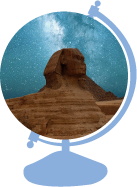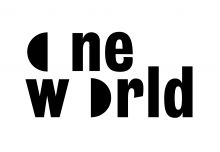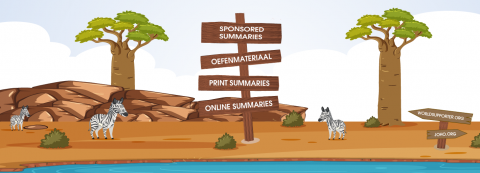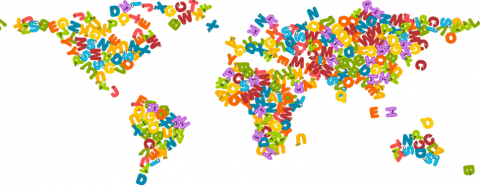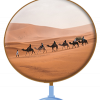We know that for example biology and physics are sciences. But what is it that makes something a science? Science seems to want to understand, explain and predict. But this is not enough, because this does not exclude for example religion or astrology from being a science. What truly distinguishes science may have to do with the methods used (like experimentation and observation), and the fact that a general theory is sought.
What are the origins of modern science?
Between 1500 and 1750 there was the scientific revolution in Europe. In the periods before that, the dominant worldview was Aristotelianism, based on Aristotle's ideas.
The Copernican revolution was the first step in developing the modern scientific worldview. Copernicus started to attack the geocentric model of the universe (stationary earth with the planets and sun in orbit around it), widely believed then, in 1542. Copernicus came up with the heliocentric model and said the sun was the center, and the planets and the Earth were in orbit around it.
Indirectly, Copernicanism led to the development of physics, through Kepler's and Galileo's work. Kepler found that the planets do not move in circular orbits, but in ellipses. This was his first law of planetary motion, and his second and third ones were about the speed. Galileo was one of the first users of a telescope and discovered a lot with it, helping to convert the view from Aristotelianism to Copernicanism.
Galileo also came up with the idea that all freely falling things will fall at the same rate, no matter the weight (but only in a vacuum, because air resistance plays in a part). So he was against the Aristotelian theory that heavier things fall faster. And he came up with the law of free fall, saying freely falling things accelerate uniformly. He is often viewed as the first modern physicist, also being the first one to start using mathematical language to describe physical reality, and being important in emphasizing experimental testing.
Descartes came up with a new mechanical philosophy, saying the world consists of inert particles of matter interacting with each other. He believed the laws governing this motion were the key to understanding the universe's structure. This became the dominant scientific vision in the late 17th century, defeating Aristotelianism.
The scientific revolution then climaxed in Isaac Newton's precise work. He improved on Descartes' work and came up with a dynamical, mechanical theory of great power, which was based around his three laws of motion and his principle of universal gravitation, so, gravity. Newton also invented the mathematical technique of calculus. Scientific confidence grew due to Newtons work, which was believed to basically show how nature works.
In the early 20th century, this confidence was shattered, due to two new developments: relativity theory and quantum mechanics. Relativity theory, by Einstein, showed that Newton's ideas do not work when applied to very massive objects, or objects moving at very high speed. And quantum mechanics show that Newton's ideas do not work when applied on a very small scale, to subatomic particles. These two theories conflict with common sense and with people's understanding, and they caused a sort of confusion and turn in physics.
In biology, the big event is Darwin's theory of evolution and natural selection. Another important revolution is the emergence of molecular biology and genetics, which is not yet complete. It started with the discovery of DNA by Watson and Crick, and ultimately this revolution transformed our understanding of heredity and development, but there are probably still many exciting developments to come in this field.
There are many new scientific disciplines like computer science and artificial intelligence. Also, cognitive science and neuroscience have developed greatly. Furthermore, social sciences like economics and sociology flourished in the 20th century, but some say they are still behind the natural sciences.
What is philosophy of science?
The main task in philosophy of science is to analyze the inquiry methods used in science. Philosophers want to question assumptions that scientists sometimes take for granted. However some scientists, like Newton and Einstein, were also busy with philosophy. Modern scientists do not seem really interested, probably due to the increased specialized nature of science, and the increased division between sciences and humanities.
What's the difference between science and pseudo-science?
Popper, a 20th-century philosopher of science, thought the fundamental feature of science is falsifiability: a scientific theory should make predictions that are capable of being tested, and if they turn out wrong, the theory is falsified. If this criterium is not satisfied, it is pseudo-science, according to Popper. Popper believed Freud's psychoanalytic theory was pseudo-science because this theory could go with all results and never really turn out false. He also thought the same of Marx's theory of history, which claimed that in industrialized societies, capitalism would give way to socialism and then to communism. But when this didn't happen, Marxists would come up with some new explanation for it and still believe in their theory, so Popper viewed it as pseudo-science.
Einstein's general relativity theory (about starlight being deflected by the sun) was true science according to Popper, since it makes a very definite prediction that can be tested, and when it would have turned out false, the theory would have been falsified.
Many philosophers view Popper's criterion as too simplistic, and not being accurate in all cases: some established scientists also come up with new explanations to stand by their theory, and this sometimes leads to scientific improvement.
So does science have an essential feature that makes it science? It's difficult, because science is so heterogeneous.
Voor volledige toegang tot deze pagina kan je inloggen
Inloggen (als je al bij JoHo bent aangesloten)
Aansluiten (voor online toegang tot alle webpagina's)
Hoe het werkt
- Om alle online toegang te krijgen, kun je je aansluiten bij JoHo (JoHo Membership + Online Toegang)
- vervolgens ontvang je de link naar je online account en heb je online toegang
Aanmelden bij JoHo

- 1 of 2
- volgende ›
Chapters
Teksten & Informatie
JoHo 'chapter 'pagina
Wat vind je op een JoHo 'chapter' pagina?
- JoHo chapters zijn tekstblokken en hoofdstukken rond een specifieke vraag of een deelonderwerp
Crossroad: volgen
- Via een beperkt aantal geselecteerde webpagina's kan je verder reizen op de JoHo website
Crossroad: kiezen
- Via alle aan het chapter verbonden webpagina's kan je verder lezen in een volgend hoofdstuk of tekstonderdeel.
Footprints: bewaren
- Je kunt deze pagina bewaren in je persoonlijke lijsten zoals: je eigen paginabundel, je to-do-list, je checklist of bijvoorbeeld je meeneem(pack)lijst. Je vindt jouw persoonlijke lijsten onderaan vrijwel elke webpagina of op je userpage
- Dit is een service voor JoHo donateurs en abonnees.
Abonnement: nemen
- Hier kun je naar de pagina om je aan te sluiten bij JoHo, JoHo te steunen en zelf en volledig gebruik te kunnen maken van alle teksten en tools.
Abonnement: checken
- Hier vind je wat jouw status is als JoHo donateur of abonnee
Prints: maken
- Dit is een service voor wie bij JoHo is aangesloten. Wil je een tekst overzichtelijk printen, gebruik dan deze knop.


